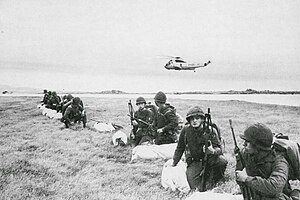First Florida War: Difference between revisions
Potatoduck (talk | contribs) No edit summary |
Potatoduck (talk | contribs) No edit summary |
||
| (One intermediate revision by the same user not shown) | |||
| Line 107: | Line 107: | ||
== International Reaction == | == International Reaction == | ||
The United Nations General Assembly adopted a General Assembly Resolution on 15 April 1981 by a vote of 108 to 9 which "deeply deplores the armed intervention in Florida, which constitutes a flagrant violation of international law and of the independence, sovereignty and territorial integrity of that State". It went on to also deplore "the death of innocent civilians" by the Federation | The United Nations General Assembly adopted a General Assembly Resolution on 15 April 1981 by a vote of 108 to 9 which "deeply deplores the armed intervention in Florida, which constitutes a flagrant violation of international law and of the independence, sovereignty and territorial integrity of that State". It went on to also deplore "the death of innocent civilians" by the Federation, and it called for an "immediate cessation of the armed intervention" and demanded, "that free elections be organized". | ||
[[Category:Divided States of America]] | |||
Latest revision as of 01:15, 10 August 2024
| Florida War | |||||||||
|---|---|---|---|---|---|---|---|---|---|
| Part of The Collapse of the United States | |||||||||
 Floridian Provisional Forces on the shores of the Florida Keys. A Sea King helicopter can be seen flying in the background. | |||||||||
| |||||||||
| Belligerents | |||||||||
|
• |
| ||||||||
| Commanders and leaders | |||||||||
| Joseph Metcalf III | George Wallace | ||||||||
| Strength | |||||||||
|
• 1,300 Standard Infantry • ~750 Floridian Militiamen • ~150 Cuban Exiles • 3 M48 Patton Tanks • 2 M60 Tanks • 1 M551 Sheridan Tank • 1 LHA (USS Saipan (LHA-2)) • 1 Battleship (USS Massachusetts (BB-59)) • 1 Heavy Cruiser (USS Salem (CA-139)) • 25 SAS Operatives • 1 Aircraft Carrier (HMS Hermes (R12)) • 10 Fighters |
• 1,400 Standard Infantry • ~600 Militiamen • 15 West Coast Holdout defectors • 4 Jackson Tanks (M48 Patton) • 15 Fighters | ||||||||
| Casualties and losses | |||||||||
|
243 Killed 467 Wounded 45 Captured 3 Wounded 1 Fighter Damaged |
International Estimate: ~340-435 Killed ~500 Wounded 1 Tank Destroyed 7 Fighters shot down Per-American Federation 200 Killed 300 Wounded 1 Tank Destroyed 5 Fighters shot down | ||||||||
The First Florida War, also known as the Invasion of Florida or the Battle of Florida, was a conflict in the aftermath of the collapse of the United States.
After the secession of the American Federation in the aftermath of Three Mile Island, like most states who had done the same (such as the Anarchist attacks in the Midwestern Union or the Providence Rebellion in the Commonwealth), the Federation had to deal with insurgencies and partisan attacks. After a crackdown on protesters in Tampa and Tallahassee, the Tokyo Accords (mostly the UC and UK) began supporting rebel groups throughout the Federation. The Federation fired on a Commonwealth ship suspected of smuggling weapons to insurgents on the 13 March, which resulted in an Anglo-Commonwealth airstrike on military shipments two days later, which in turn caused more attacks on Commonwealth shipping, resulting in a full Commonwealth invasion on the 17th. The invasion would end in an armistice 4 months later, with a demilitarized zone being established along the border of the two Floridas. The end of the war would also see the recognition of Reedy Creek and the beginning of the Federation's Civil War soon after.
International Reaction
The United Nations General Assembly adopted a General Assembly Resolution on 15 April 1981 by a vote of 108 to 9 which "deeply deplores the armed intervention in Florida, which constitutes a flagrant violation of international law and of the independence, sovereignty and territorial integrity of that State". It went on to also deplore "the death of innocent civilians" by the Federation, and it called for an "immediate cessation of the armed intervention" and demanded, "that free elections be organized".